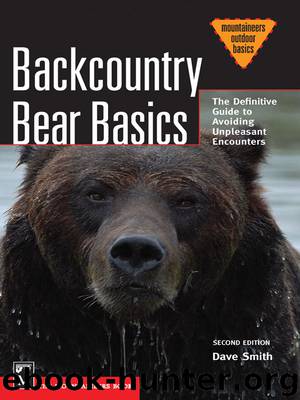Backcountry Bear Basics by Dave Smith

Author:Dave Smith
Language: eng
Format: epub
Publisher: The Mountaineers Books
Published: 2012-11-13T05:00:00+00:00
Grizzlies stand on their hind legs so they can see, hear, and smell better. They lunge forward as they drop to the ground, which is often misinterpreted as a charge. Sometimes a bear will circle downwind to confirm with its nose what it has seen with its eyes.
On the maze of trails that lace parks like Yellowstone and Jasper, there are so many people hiking through grizzly country that the amount of noise you make raises ethical and esthetic concerns. All the commotion displaces grizzlies from their preferred habitat. It ruins the tranquility for other hikers who came to the backcountry to escape the city’s mechanical sounds. It disturbs bison, mountain goats, trumpeter swans, and other wildlife. Those critters don’t have anywhere else to go. You do. If you’re so nervous about grizzly bears that you have to make an excessive amount of noise, why not hike someplace where there are no grizzly bears?
Of course, the key word here is “excessive.” What’s excessive? Everyone has their own definition. You’ll have to decide for yourself when you’re afield.
Personally, I clap my hands or give a loud “hey Joe” when necessary. (“Hey Joe” is better than “Hey bear” because other hikers hearing “hey bear” might think you’re yelling at a nearby bear.) I’d hike in a Scottish kilt and cowboy boots before I’d wear bear bells or walk with a group of people who talked nonstop for 8 hours straight. What would you talk about? The Internet? The World Series? Cosmetics? If you’re walking through Jasper National Park’s backcountry talking and thinking about politics, perhaps you should reconsider your whole approach to the wilderness.
My philosophy is to leave the urban world behind and focus outward. I strive to see or hear grizzlies before they’re aware of me. I pay attention. I think about where I am and what I’m doing. As biologist Steve Herrero notes, “Your best weapon to minimize the risk of a bear attack is your brain.”7 I don’t believe it’s possible for your brain to simultaneously tune out the steady ring, ring, ringing of bear bells, talk about what you’re going to have for dinner, and focus on your surroundings.
My friend Steve Fuller, a Yellowstone winterkeeper says he often notices train lines of noisy hikers while riding his horse in the backcountry, but they’re not always aware of him. They’re not paying attention. “Physically,” says Fuller, “they’ve escaped the city and left behind the walls of their apartments and automobiles. But not mentally. They’re alienated from the environment.”
The kinds of hikers who don’t spot a man sitting on a 1,000-pound horse aren’t likely to see a 400-pound bear that’s only 3 feet tall at the shoulders. They’re operating on four dubious assumptions. One, it’s the bear’s responsibility to hear them coming. By making noise they’ve done their part; the rest is up to the bear. Two, bears will hear them coming. Three, a bear will leave when it hears them approaching. Four, it’s all right to drive grizzlies away from their food and preferred habitat—not to mention disturbing other wildlife and hikers.
Download
This site does not store any files on its server. We only index and link to content provided by other sites. Please contact the content providers to delete copyright contents if any and email us, we'll remove relevant links or contents immediately.
Annapurna by Maurice Herzog(2834)
Into Thin Air by Jon Krakauer(2692)
SAS Survival Handbook by John 'Lofty' Wiseman(2253)
The Ogre by Doug Scott(2104)
Reservoir 13 by Jon McGregor(1846)
Everest the Cruel Way by Joe Tasker(1822)
The End of Eddy by Édouard Louis(1744)
Touching the Void by Joe Simpson(1702)
The Push by Tommy Caldwell(1680)
Iced In by Chris Turney(1574)
The Call of Everest by Conrad Anker(1546)
The Isle of Mull by Terry Marsh(1516)
Miracle in the Andes by Nando Parrado(1488)
Touching the Void (1987) by Joe Simpson(1409)
Mud, Sweat, and Tears by Bear Grylls(1293)
Himalaya Bound by Michael Benanav(1254)
Higher Calling by Max Leonard(1236)
Death Grip by Matt Samet(1156)
Backcountry Bear Basics by Dave Smith(1127)
